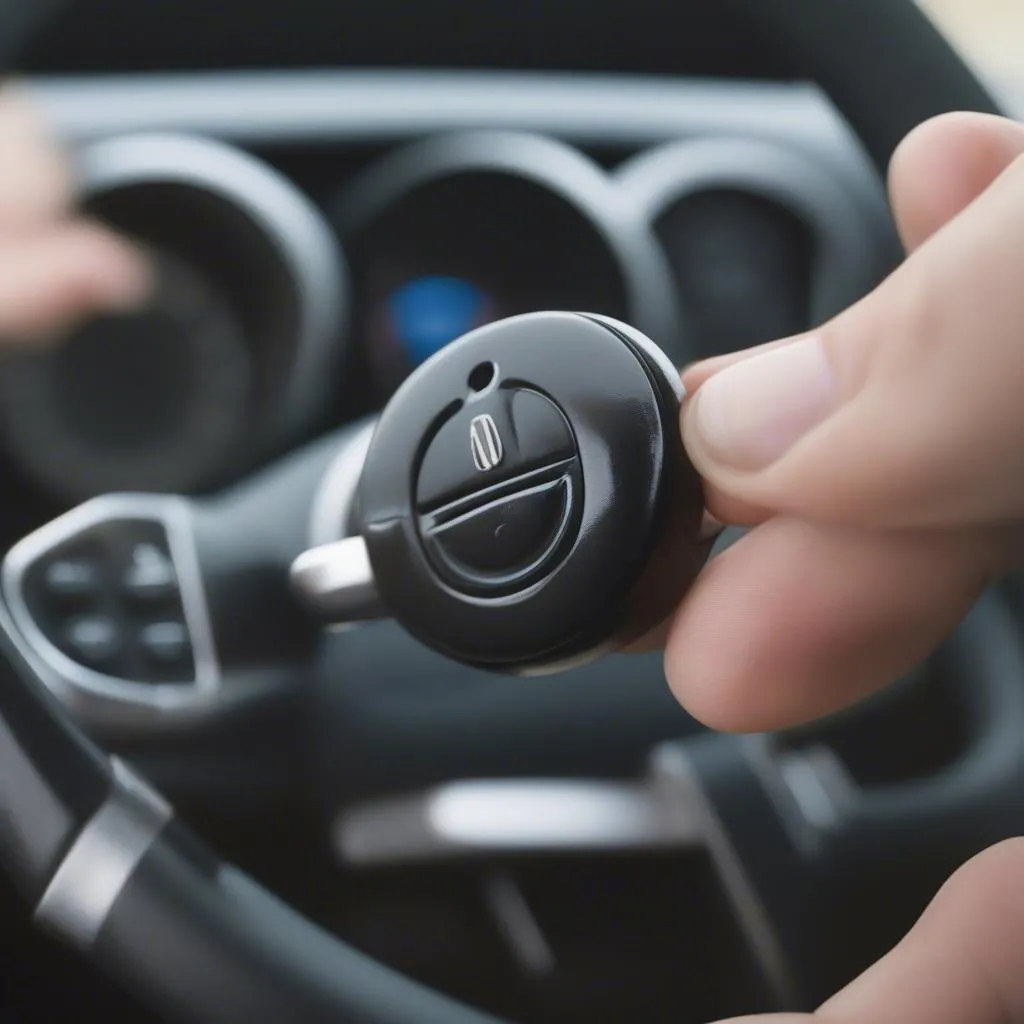Getting that flashing light on your dashboard and realizing your anti-theft system is acting up can be frustrating. But how do these systems work to keep your car safe? And what should you do when something goes wrong?
This article will delve into the intricacies of anti-theft car locks, explaining the technology that safeguards your vehicle and providing helpful insights into common issues and solutions.
Understanding Anti-theft Systems: A Look Inside
Modern vehicles often employ a system known as an immobilizer, a key component of your car’s anti-theft system.
How Immobilizers Work:
Immobilizers work by preventing the engine from starting without the presence of a specific signal from your car key. This signal, often transmitted via a Radio Frequency Identification (RFID) chip embedded in the key, communicates with the car’s Engine Control Unit (ECU).
- Key Recognition: When you insert your key or press the start button, the ECU sends out a signal to the key’s RFID chip.
- Signal Verification: The RFID chip, if powered by a battery in the key fob or by the car’s system inductively, transmits a unique code back to the ECU.
- Engine Start Authorization: The ECU checks the received code against its stored data. If the code is a match, the ECU allows the engine to start. If the code is not recognized, the immobilizer system engages, effectively preventing the engine from turning on.
Beyond Immobilizers: Additional Security Features
While immobilizers are a standard feature, many modern vehicles offer advanced anti-theft systems with added layers of security, such as:
- Alarm Systems: These systems use sensors to detect forced entry or movement and trigger a loud alarm to deter theft.
- GPS Tracking: Vehicles equipped with GPS tracking systems allow owners and authorities to locate a stolen car quickly.
- Remote Keyless Entry (RKE): RKE systems allow for convenient locking and unlocking, often using rolling codes to prevent code grabbing technology used by thieves.
Common Anti-Theft System Issues
Even the most sophisticated technology can encounter problems. Here are some frequent issues that might arise with your car’s anti-theft system:
- Key Fob Battery: A dead key fob battery can disrupt the communication between your key and the car, leading the immobilizer to think the wrong key is being used.
- Faulty RFID Chip or Antenna: Damage or malfunctioning of either the RFID chip in your key or the antenna ring in the ignition cylinder can disrupt the signal transmission, causing starting issues.
- ECU Problems: While less common, issues with the ECU itself can interfere with its ability to communicate with the key, resulting in immobilizer problems.
Troubleshooting and Solutions
If you’re experiencing problems with your anti-theft system, don’t panic! Here’s what you can do:
- Check the Basics: Begin by replacing the battery in your key fob. It’s a simple fix that often resolves the issue.
- Consult Your Owner’s Manual: Your car’s manual can offer specific instructions and troubleshooting tips for your vehicle’s anti-theft system.
- Professional Diagnostics: For persistent problems, it’s advisable to seek assistance from a qualified automotive locksmith or a reputable mechanic specializing in automotive electronics. They have the expertise and tools, including advanced diagnostic equipment, to pinpoint and resolve more complex issues. For remote diagnostics and software solutions, consider the services provided by companies like Cardiagtech.
FAQs about Anti-theft Systems
Can I bypass my car’s immobilizer?
It’s strongly discouraged to attempt bypassing your car’s immobilizer. These systems are designed for your protection. Tampering with them could lead to further damage, void warranties, and even have legal consequences.
Can I disable the alarm system without affecting the immobilizer?
In most cases, the alarm and immobilizer functions are separate, even if they are part of a single anti-theft system. Disabling one should not inherently disable the other. However, the exact method for doing so can vary greatly between car manufacturers and models. Always consult your owner’s manual for the correct procedure.
What should I do if my key fob is lost or stolen?
If you lose your key fob, contact your dealership or an authorized locksmith as soon as possible. They can help you order a replacement key and program it to your car.
Can Cardiagtech help with anti-theft system issues?
CARDIAGTECH specializes in remote diagnostics and software solutions for various car problems, including some anti-theft system issues. For a complete diagnosis and expert solutions, don’t hesitate to reach out to CARDIAGTECH.
Staying Safe and Secure
Understanding how your car’s anti-theft system works empowers you to address potential issues effectively. Remember, professional assistance is always recommended for any significant problems or if you’re unsure about any procedure. By taking the proper precautions and seeking expert help when needed, you can ensure your vehicle remains secure and protected.


